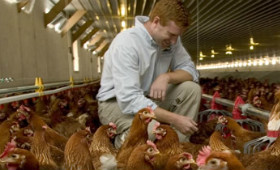Businesses Find Benefits in Going Green
By Joanna L. Krotz

At last, eco-friendly products and services are paying off in new and scalable ways. See how green can work for you by checking out these forward-looking business models.
Incentives to go green have moved way beyond lowering utility bills.
“Cost savings are evolving into revenue generation,” says Lauren Kelley Koopman, a director for PwC’s Sustainable Business Solutions practice. “Sustainability is next-generation business thinking because it creates value, attracts customers, retains employees and improves capital and funding.”
In 2012, an Office Depot tracking poll found 61 percent of small businesses were trying to go greener, while 70 percent anticipated going green over the next two years.
Reinventing the roost
Jesse Laflamme, now 35, didn’t expect to be down on the farm again after graduating in 2000 from Bates College in Lewiston, Maine. “My parents didn’t encourage me to come back,” he says. “They didn’t feel there was a future.”
Founded by Laflamme’s grandfather, the 200-acre egg farm — now called Pete and Gerry’s Organics — was being muscled out by big agribusiness producers. Such operations, says Laflamme, typically cram 150,000 caged chickens into the same amount of space his family uses to house 15,000 cage-free hens.
Encouraged by his wife, Sandra, who grew up outside Philadelphia, Laflamme took over. “We started by making the transition to local eggs, identifying who we were,” he says. “That evolved to organic.” Consumer demand for regionally sourced, higher-priced organic foods hatched growth.
Today, Pete and Gerry’s, located in New Hampshire’s White Mountains, is a regional powerhouse, distributing “Certified Humane®” organic eggs up and down the East Coast. “For the past 13 years, we’ve had compound annual growth of 35 percent, with revenue north of $50 million,” says Laflamme, “although the nature of agriculture means gross margins are pretty narrow.” He also works to support family farms by partnering with 40 or so neighbors, some of whom switched to egg production after the success of Pete and Gerry’s.
Not long ago, the triple bottom line — people, profit and planet — was considered hopelessly idealistic. Nowadays, instead of greed, it seems green is good.
Full Article:
http://businessonmain.msn.com/browseresources/articles/businesswithaconscience.aspx?cp-documentid=257156228#fbid=LnOvodhLGwI

MSN Business on Main
Posted: April 16, 2013 by Certified Humane
Businesses Find Benefits in Going Green
By Joanna L. Krotz
At last, eco-friendly products and services are paying off in new and scalable ways. See how green can work for you by checking out these forward-looking business models.
Incentives to go green have moved way beyond lowering utility bills.
“Cost savings are evolving into revenue generation,” says Lauren Kelley Koopman, a director for PwC’s Sustainable Business Solutions practice. “Sustainability is next-generation business thinking because it creates value, attracts customers, retains employees and improves capital and funding.”
In 2012, an Office Depot tracking poll found 61 percent of small businesses were trying to go greener, while 70 percent anticipated going green over the next two years.
Reinventing the roost
Jesse Laflamme, now 35, didn’t expect to be down on the farm again after graduating in 2000 from Bates College in Lewiston, Maine. “My parents didn’t encourage me to come back,” he says. “They didn’t feel there was a future.”
Founded by Laflamme’s grandfather, the 200-acre egg farm — now called Pete and Gerry’s Organics — was being muscled out by big agribusiness producers. Such operations, says Laflamme, typically cram 150,000 caged chickens into the same amount of space his family uses to house 15,000 cage-free hens.
Encouraged by his wife, Sandra, who grew up outside Philadelphia, Laflamme took over. “We started by making the transition to local eggs, identifying who we were,” he says. “That evolved to organic.” Consumer demand for regionally sourced, higher-priced organic foods hatched growth.
Today, Pete and Gerry’s, located in New Hampshire’s White Mountains, is a regional powerhouse, distributing “Certified Humane®” organic eggs up and down the East Coast. “For the past 13 years, we’ve had compound annual growth of 35 percent, with revenue north of $50 million,” says Laflamme, “although the nature of agriculture means gross margins are pretty narrow.” He also works to support family farms by partnering with 40 or so neighbors, some of whom switched to egg production after the success of Pete and Gerry’s.
Not long ago, the triple bottom line — people, profit and planet — was considered hopelessly idealistic. Nowadays, instead of greed, it seems green is good.
Full Article:
http://businessonmain.msn.com/browseresources/articles/businesswithaconscience.aspx?cp-documentid=257156228#fbid=LnOvodhLGwI
Category: news